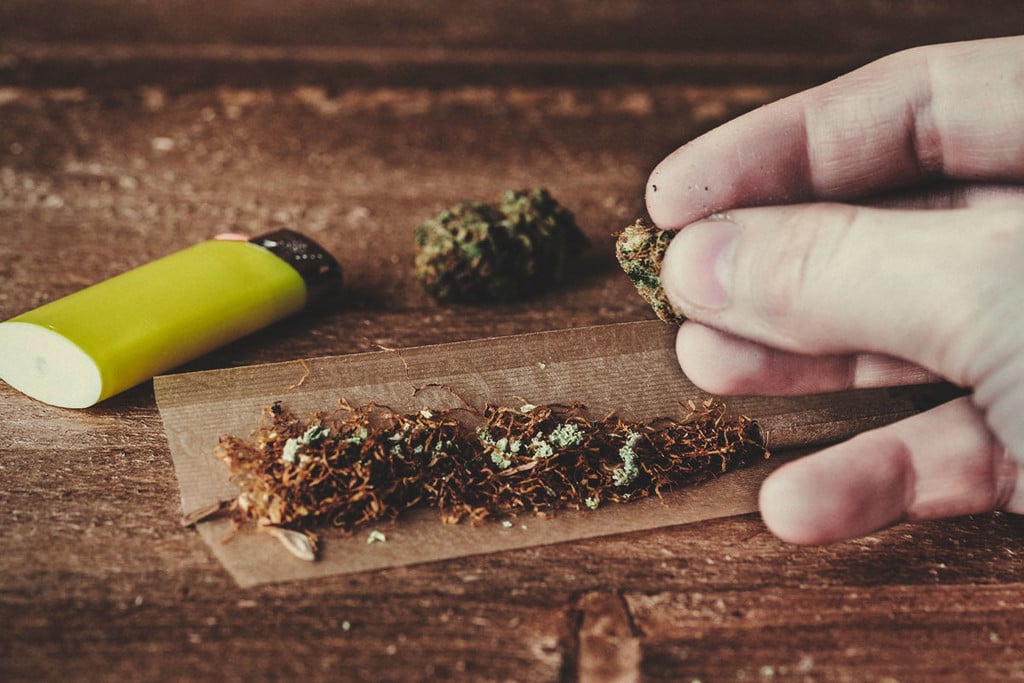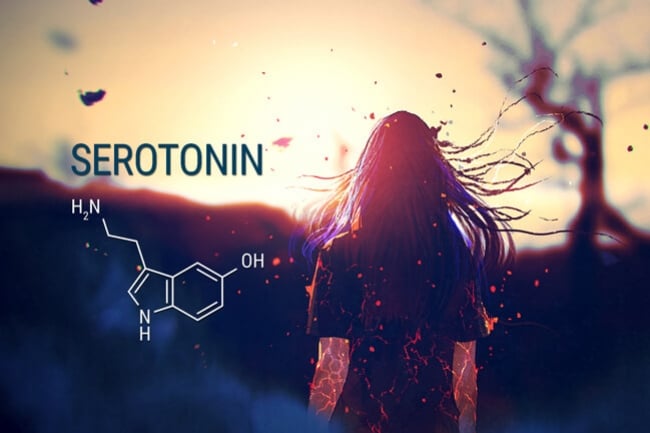.
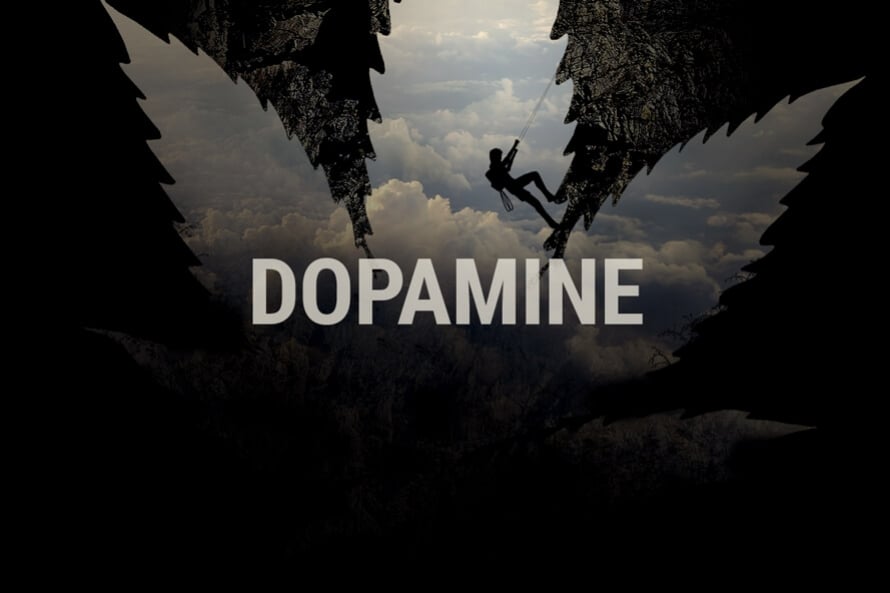
The Link Between Marijuana and Dopamine
Cannabis has a nuanced effect on the dopamine system. While THC boosts the levels of this happy hormone initially, things change with chronic use. Blazing too much, too often, can lead to a blunting of the dopamine system. Find out the details, and how to use cannabis in a way that benefits your brain's reward system.
Contents:
Dopamine. You’ve probably heard of this brain chemical before. Also known as the “feel-good” hormone, this molecule plays an important role in our mood. But aside from promoting happiness, dopamine contributes to more complex feelings and behaviours, including reward and addiction.
Do you know what else gives rise to feelings of happiness? Cannabis. This herb can rapidly catapult us into a positive state. This effect is due to THC which, according to studies, generates a short-term increase in dopamine levels in the brain. And indeed, cannabis research over the years has drawn a connection between smoking or ingesting cannabis and a rise in dopamine concentration.
However, things get a little bit more complex when comparing the short-term and long-term effects. Acutely, cannabis does appear to boost dopamine. But the herb might interfere with normal dopamine signalling when used chronically. Continue reading to discover the importance of dopamine, how cannabis impacts this brain chemical, and how CBD also influences this system.
What Is Dopamine?
Dopamine is a neurotransmitter. What does this mean? Well, neurons (brain cells) release this chemical to transmit electrical signals chemically between one another. But not every neuron spends its time churning out dopamine. The body reserves this role for nerve cells located in the substantia nigra—a region of the brain that plays a fundamental role in reward and movement. Overall, dopaminergic neurons make up approximately between 3 and 5% of this area.
These specialised cells craft dopamine using tyrosine (an amino acid). After manufacturing this neurotransmitter, they store it in synaptic vesicles—spherical packages that merge with cell membranes and allow neurons to safely release the chemical. Neurons lie in wait ready for a shock. Once they receive a jolt of electricity (known as an action potential), they release dopamine. The molecule[5] then travels across the synaptic cleft to bind to any of the five subtypes of dopamine receptors: D1, D2, D3, D4, or D5.
Technical details aside, what impact does this seemingly simple action have on our overall state of consciousness? Dopamine's vital function in the brain means it plays an important role in:
| Executive function | Motor control | Motivation | Reinforcement |
| Reward | Learning | Mood | Attention |
| Executive function | Motor control |
| Motivation | Reinforcement |
| Reward | Learning |
| Mood | Attention |
This single molecule has a massive impact on how we operate in daily life. It sways the decisions we make, helps us get out of bed, and even plays a role when we reach for a joint or bong. You see, dopamine pretty much has full control over what we view as rewarding behaviour.


-
Dopamine and the Reward System
Only a handful of factors drive human behaviour. First, there are things we can’t live without, such as water, food, and shelter. Second, there are rewards—certain behaviours that cause us to feel pleasure.
But how does the brain recognise the value of a reward? It has a specialised reward system. Regions of the brain that make up this reward system use dopamine as a chemical messenger. These neurons start to fire when the brain expects a reward. As well as making us feel happier in the moment, dopamine strengthens synaptic pathways and causes us to develop emotional memories tied to specific rewards.
As this network strengthens, the reward system begins to reinforce behaviours associated with rewarding outcomes. Why would your brain choose not to have a good time? It all makes sense from an evolutionary perspective. After all, the reward associated with landing a meal kept our ancestors alive. Without the motivation of a reward circuit, they would have spent their time sitting around starving to death.
However, this system can and does backfire. The brain quickly becomes fond of sugary foods and pleasant psychotropic experiences—the cannabis high included. While these sources of joy are great in moderation, they can take a toll when used chronically over long periods. And a strongly reinforced reward system can keep us chasing the pleasant effect, without much regard for the long-term consequences.
The effects of dopamine span past behaviour and mood, affecting broader aspects of human physiologically, including:
| Control of nausea and vomiting | Pain processing | Movement | Kidney function |
| Heart rate | Blood vessel function | Lactation |
| Control of nausea and vomiting | Pain processing | ||||||
| Movement | Kidney function | ||||||
| Heart rate | Blood vessel function | ||||||
| Lactation | |||||||
|---|---|---|---|---|---|---|---|
Among these additional roles, dopamine contributes to human movement. The nervous system allows us to voluntarily contract our skeletal muscles, enabling us to articulate our joints and move. Dopamine is involved in the biochemical communication that fine-tunes an organism’s movement. In cases of Parkinson’s disease, the degeneration of dopamine neurons leads to spontaneous movement, poor balance, and reduced motor coordination.
What’s the Link Between Marijuana and Dopamine?
Smoking or eating cannabis causes a change in mood, focus, and motivation. Dopamine also impacts these sensations, so it comes as no surprise that using cannabis influences dopaminergic function.
Constituents from the cannabis plant have a broad impact on the human body because they interface with the endocannabinoid system (ECS). The receptors, signalling molecules, and enzymes that make up this network help to regulate a host of physiological processes, from bone remodelling to appetite.
Components of the ECS also show up in dopamine neurons. Here, they serve as somewhat of a traffic controller. Most neurotransmitters in the brain travel in an antegrade fashion. This means that they’re synthesised in the presynaptic neuron and bind to receptors on the postsynaptic neuron.
Endocannabinoids go against the grain. They travel in a retrograde manner, from postsynaptic to presynaptic neurons. This directional difference gives them a unique function.
By travelling backwards, they can regulate the incoming signals from other neurons[1]. This interaction is extremely nuanced, but in simplified terms: by inhibiting the flow from GABA neurons, endocannabinoids help to enhance the firing of dopamine neurons. In contrast, by inhibiting incoming glutamate signals, they reduce the firing rate of dopamine neurons.
The endocannabinoid 2-arachidonoylglycerol (2-AG) binds to a site known as cannabinoid receptor 1 (CB1) to modify presynaptic input. Interestingly, cannabinoids such as THC also bind to this receptor, which means they also have the ability to impact dopamine firing.
-
Short-Term Effects of Marijuana on Dopamine
The effects of cannabis on dopamine vary depending on certain variables, including frequency and quantity.
Following short-term use, cannabis causes a surge in dopamine. But how does it do this? THC, the primary psychotropic component of cannabis, effectively mimics 2-AG. It starts to bind to the CB1 receptors located on presynaptic GABA and glutamate neurons. The molecule disrupts normal ECS signalling[2] and results in increased dopaminergic cell firing and increased dopamine release.
Therefore, THC directly impacts the reward system of the brain. As a behaviour that ramps up sensations of reward, smoking high-THC cannabis causes temporary feelings of relaxation, euphoria, creativity, and motivation. However, these feelings begin to wane with chronic use.
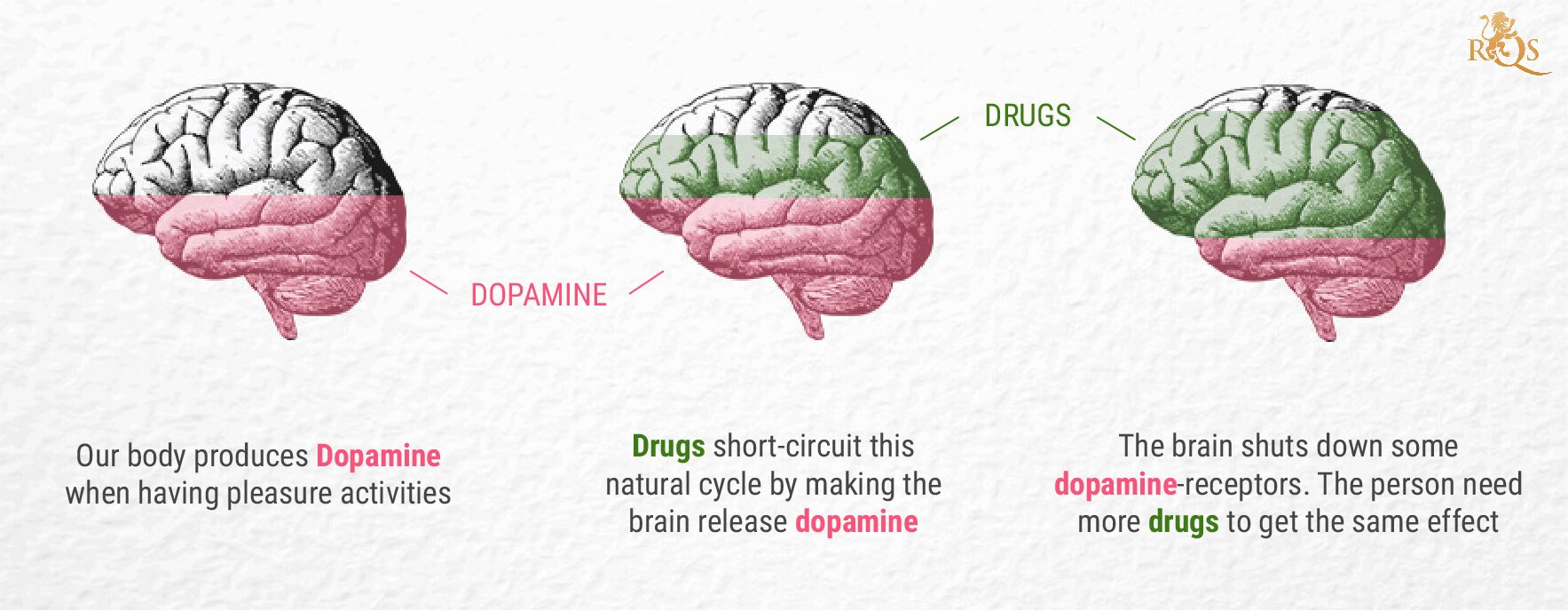
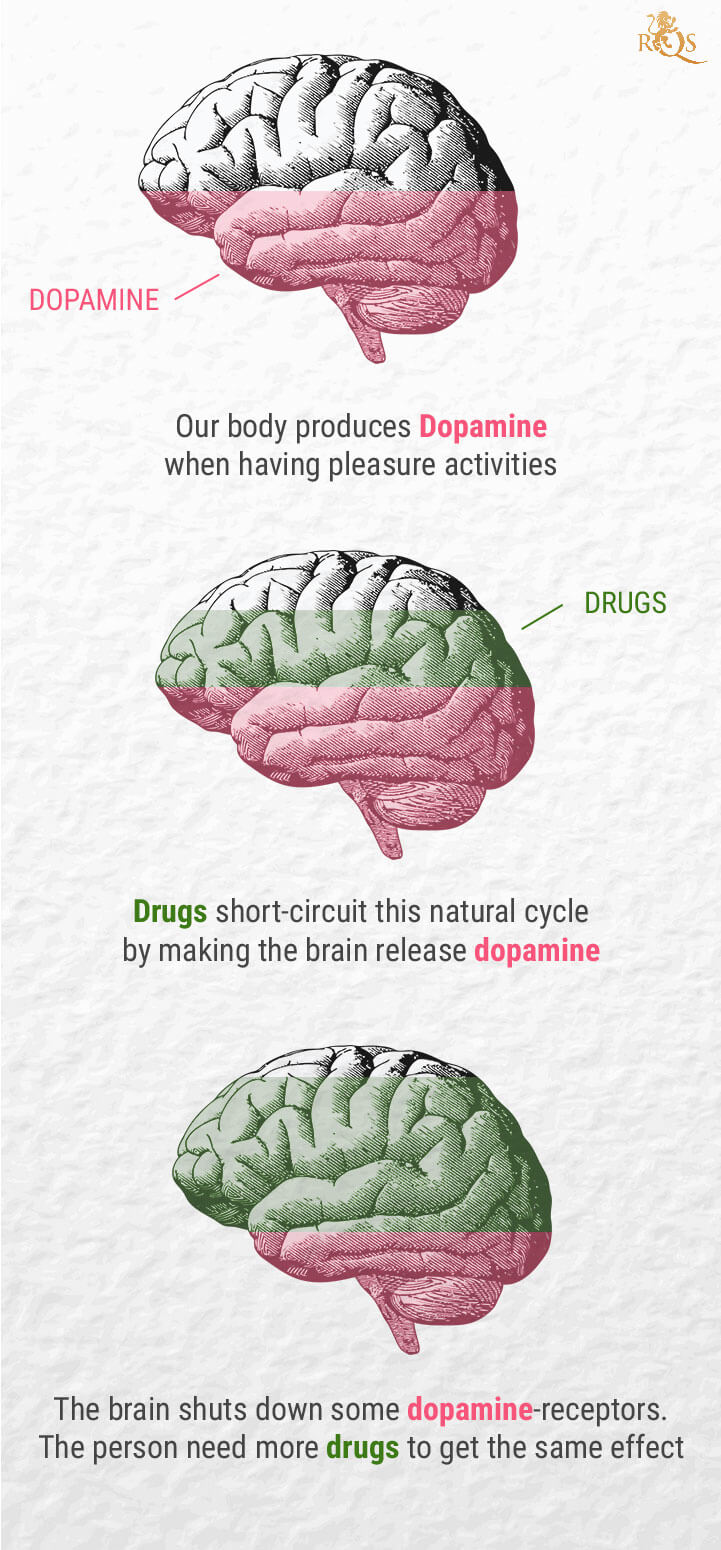
-
Long-Term Effects of Marijuana on Dopamine
Using cannabis consistently over many years changes the way the brain reacts to cannabinoids, and causes a shift in the dopaminergic system itself. Chronic use causes a blunting of the dopamine reward system, and although researchers aren’t entirely sure why this occurs, adaptation to high levels of THC is often associated with reduced motivation[3] and negative emotions.
A 2019 paper published in the journal Addiction Biology documents a double-blind, placebo-controlled trial that assessed the effects of cannabis[4] on chronic and occasional cannabis users. The researchers also carried out functional magnetic resonance imaging to observe how the herb affected the participants' brains. They found significant neurometabolic alterations in the reward circuitry of occasional users.
In contrast, these changes were absent in the brains of chronic users, suggesting reduced responsiveness of the reward circuitry to THC. These findings point toward possible dopamine blunting and the development of tolerance following long-term, heavy use.
-
Weed and Dopamine: Does Cannabis Increase the Happy Hormone?
Yes. As THC mimics endocannabinoids in the brain, it causes changes in the release of neurotransmitters such as GABA and glutamate. Overall, this catalyses an initial increase in dopamine neuron firing and an increase in dopamine level.
However, these effects start to diminish over time. As tolerance builds, THC no longer produces the same effects, and a blunting of the dopamine system occurs.
What About CBD and Dopamine?
So, you’re aware that THC impacts the dopamine system by mimicking our endocannabinoids, but it’s not the only cannabinoid that causes changes to the reward system. Whereas THC indirectly modulates incoming neurotransmitters to dopamine neurons, CBD directly binds to dopamine receptors.
As a non-psychotropic cannabinoid, CBD doesn’t produce a high as THC does. Instead, many users report a clear-headed and relaxing effect that doesn’t impair cognitive function. Though the molecule does not bind to the major ECS receptors in the same way as THC, it does attach itself to a variety of “expanded ECS” receptors, as well as the D2 dopamine receptor.
Research published in the journal Translational Psychiatry set out to explore the mechanisms by which CBD impacts the dopaminergic system. They found that the cannabinoid works as a partial agonist at the D2 dopamine receptor, meaning it directly interacts with the reward system in the brain.
Future research will hopefully explore the significance of this relationship, how it might frame CBD as a holistic compound, and if frequent high doses cause any detrimental impact on the reward system of the brain.


Should You Be Worried About the Effect of Marijuana on Dopamine?
With the knowledge you now have about cannabis and dopamine, if anything, it should improve your relationship with the herb. Knowledge is power, and knowing exactly how cannabis impacts important neurotransmitters in your brain will hopefully motivate you to use the herb responsibly.
Using anything to an extreme always comes with consequences. Too much cannabis can lead to an impacted reward system and poor motivation. However, smoking or eating cannabis occasionally won’t only help you to avoid this, but will offer a more pleasant experience every time you choose to indulge.
- Endocannabinoid modulation of dopamine neurotransmission https://www.ncbi.nlm.nih.gov
- The effects of Δ9-tetrahydrocannabinol on the dopamine system https://www.ncbi.nlm.nih.gov
- Cannabis blunts the brain’s reward system https://lms.mrc.ac.uk
- Reduced responsiveness of the reward system is associated with tolerance to cannabis impairment in chronic users https://onlinelibrary.wiley.com
- Dopaminergic neurons https://pubmed.ncbi.nlm.nih.gov


























